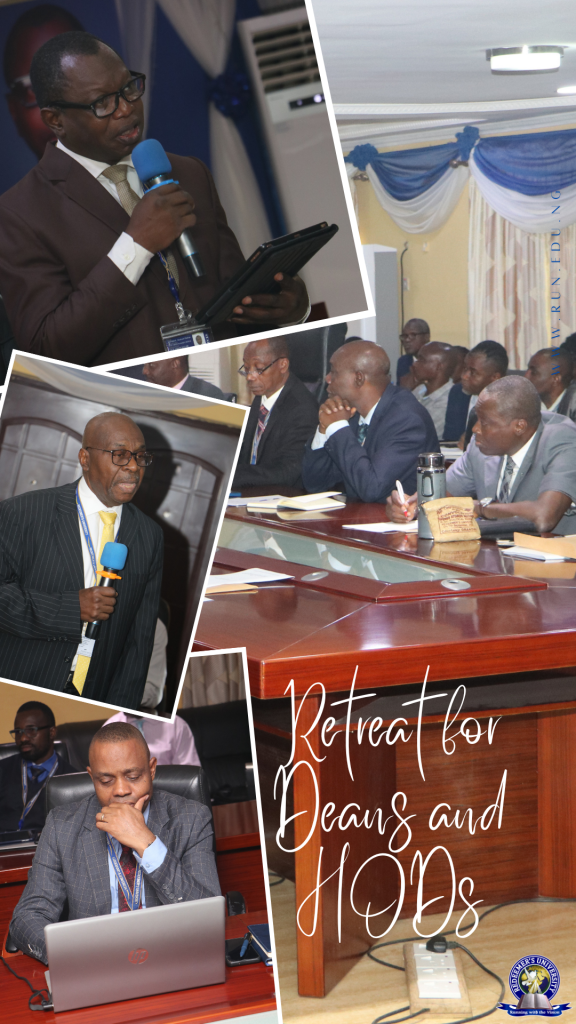The Vice-Chancellor, Redeemer’s University, Prof. Shadrach Akindele has charged all Deans and Heads of Department to lead with love and compassion as they discharge their duties to the University. He made this statement during the retreat for Deans and Heads of Department held recently at the Redeemer’s University Senate Chambers.
Prof. Akindele welcomed every individual to the gathering and appreciated all for their efforts and hard work to the university. He implored them to continue to nurture students that will turn out to be great individuals who will impact the world positivity. According to him, “as we go forward in this retreat, finish well with vigour, model Christ in all you do, lead with excellence, God’s knowledge and wisdom; and lead from a place of love and compassion”.
In his opening speech, the Deputy Vice-Chancellor, Prof. Ahmed Yerima, also appreciated the Deans and Heads of Departments for coming up with a program that aligns with the Vice-Chancellor’s visions for the university. The Director, Adeboye Institute for Peace and Good Governance (AIPGG), Prof. Femi Ayoade while delivering the first paper at the Retreat titled “Leadership for positive impact.” said effective leadership is mainly about influencing through empathy, integrity, and a vision that seeks to uplift and empower everyone involved. According to him, positive leadership leads to sustainable success, leadership will make positive impact when it is not just achieving the goal but also building people. “A leader is one who knows the way, goes the way, and also shows the way”, he said.
Prof. Ayoade further enthused that, impactful leadership is leading by example, promoting learning culture and encouraging collaboration, while the Strategies for leading with positive impact is creating a creative feedback open environment, leading through change, navigating Transitions and supporting staff well-being. Prof. Ifeolu Koni, the Dean, Faculty of Law, cited Thomas Kullman’s Model of Conflict and Resolution Management while delivering his paper titled “Conflict Resolution and Management.” He defined resolution as situations that can be solved and management as situations that cannot be solved but can be managed. He encouraged the gathering to understand that individuals have the right to hold contrary opinions, being different is constitutional and correct, he said.
The Dean of Faculty of Law further implored the Deans and Heads of Department to be accommodating and to collaborate with others. He advised them to know that defeating is assertive but not cooperative and that problems cannot be solved by avoiding it or looking away. Prof. Koni said Deans and Heads of Departments may need to sometimes come to a compromise when dealing with others and to avoid operating the Department, Faculty or Directorate as a one man show. “As a leader, learned to include everyone to have a shared responsibility and engagements,” he concluded.
Mr. David Akintola, the ActingDirector, Directorate of Student Support and Services (DSSS), while explaining the topic “Handling Student Matters at Faculty and Departmental Levels,” informed the Deans and Heads of Departments that, student matters should be directed to the Directorate of Student Support and Services through the Heads of Department, whenever there is a need for it. In the same vein, the Registrar, Mrs Mojisola Oje, spoke on “Effective Communication Between Academic & Non-Academic Departments.” She noted that written communication helps to show documents for reference purposes and that Deans and Heads of Faculty should always make complete statements when writing or supporting letters or memos that are meant for the Registry to act on.
Dr. Oludare Aiyemonisan, the Medical Director of the University Health Centre, highlighted that effective communication is a process of exchanging information through verbal and non-verbal means and that the types of communication, especially written communication, must be clear and concise to be effective. The Deputy Vice-Chancellor, in his closing remark, advised that one of the non-verbal communication all leaders must imbibe is not speaking down on students or staff members. “Learn that it is your responsibility to be mindful of what you say and how you say it to both students and staff members.”

